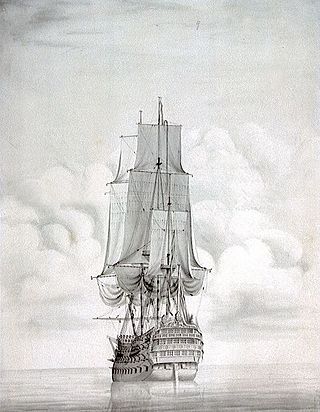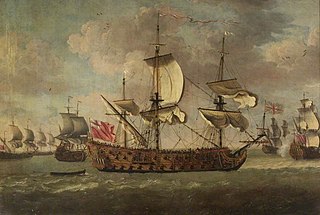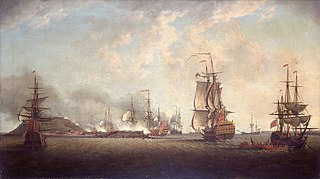
HMS Vanguard was a 90-gun second-rate ship of the line of the Royal Navy, built at Portsmouth Dockyard and launched in 1678.

HMS Albion was a 74-gun third-rate ship of the line of the Royal Navy. She was built by Adam Hayes at Deptford Dockyard and launched on 16 May 1763, having been adapted from a design of the old 90-gun ship Neptune which had been built in 1730. She was the first ship to be called HMS Albion. She was the first of a series of ships built to the same lines, which became known as the Albion-class ship of the line.

HMS Neptune was a 98-gun second-rate ship of the line of the Royal Navy. She served on a number of stations during the French Revolutionary and Napoleonic Wars and was present at the Battle of Trafalgar in 1805.

HMS Royal Oak was a 74-gun third-rate ship of the line of the Royal Navy, built by Jonas Shish at Deptford and launched in 1674. She was one of only three Royal Navy ships to be equipped with the Rupertinoe naval gun. Life aboard her when cruising in the Mediterranean Sea in 1679 is described in the diary of Henry Teonge.

HMS Prince George was a 90-gun second-rate ship of the line of the Royal Navy, launched on 31 August 1772 at Chatham. During her career, she was upgraded to a 98-gun ship, through the addition of eight 12-pounder guns to her quarterdeck.
The Albion-class ship of the line were a class of five 74-gun third-rate ships of the line, designed for the Royal Navy by Sir Thomas Slade.

HMS Sampson was a 64-gun third rate ship of the line of the Royal Navy, launched on 8 May 1781 at Woolwich.

The Caledonia-class ships of the line were a class of nine 120-gun first rates, designed for the Royal Navy by Sir William Rule. A tenth ship was ordered on 29 October 1827 to the same design, but was launched in 1833 as Queen to a fresh design by Sir William Symonds.

The Neptune-class ships of the line were a class of three 98-gun second rates, designed for the Royal Navy by Sir John Henslow. All three of the ships in the class took part in the Battle of Trafalgar in 1805.

HMS Royal Sovereign was a 100-gun first rate ship of the line of the Royal Navy, built at Woolwich Dockyard and launched in July 1701. She had been built using some of the salvageable timbers from the previous Royal Sovereign, which had been destroyed by fire in 1697.

The Canopus-class ships of the line were a class of nine 84-gun two-deck second rates of the Royal Navy. Their design was based on an enlarged version of the lines of the captured French ship Franklin, since commissioned in the Royal Navy as HMS Canopus, although this ship herself was not included as a member of the class. The earlier ships were initially ordered as 80-gun third rates, but this classification was altered by changes in the rating system in February 1817. This class of ships is sometimes referred to as the Formidable class.

HMS Monarch was an 84-gun second rate ship of the line of the Royal Navy, launched on 18 December 1832 at Chatham Dockyard.

HMS Falkland was a 50-gun fourth-rate ship of the line of the Royal Navy, built by Holland of New Castle, New Hampshire, and purchased by the navy in 1696.

HMS Swiftsure was a 70-gun third-rate ship of the line of the Royal Navy, built by Sir Anthony Deane at Harwich, and launched in 1673. By 1685 she had been reduced to a 66-gun ship.

HMS Neptune was a 90-gun second-rate ship of the line of the Royal Navy. She was built under the 1677 "Thirty Great Ships" Programme and launched in 1683 at Deptford Dockyard.

HMS Severn was a 50-gun fourth-rate ship of the line of the Royal Navy, launched at Sir Henry Johnson's Blackwall Yard on 16 September 1695. The commercial contract had originally been agreed with Johnson on 16 November 1693, but the latter two were delayed and a fresh contract for them agreed on 7 December 1694.

HMS Mary was a 60-gun fourth rate ship of the line of the Royal Navy, built at Chatham Dockyard and launched on 12 May 1704.

HMS Prince of Orange was a 70-gun third rate ship of the line of the Royal Navy, built by Richard Stacey to the 1719 Establishment at Deptford Dockyard, and launched on 5 September 1734.

HMS Ruby was a 50-gun fourth rate ship of the line of the Royal Navy, built at Bursledon in Hampshire to the dimensions specified in the 1741 proposals of the 1719 Establishment, and launched on 3 August 1745.

HMS Neptune was a 90-gun second rate ship of the line of the Royal Navy, built at Portsmouth Dockyard to the draught specified by the 1745 Establishment as amended in 1750, and launched on 17 July 1757.


















